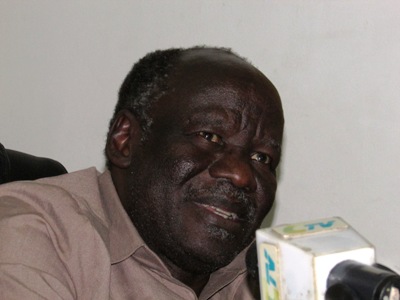South Sudan opposition leader slams passing of security bill
October 9, 2014 (JUBA) – The leader of the opposition Sudan People’s Liberation Movement for Democratic Change (SPLM-DC), Lam Akol has criticised the manner in which the House passed the country’s new security bill, saying it contravened its conduct of business regulations that allows lawmakers 72 hours to study any resolution tabled for final vote.

“The official opposition in South Sudan parliament today (Wednesday) stormed out of the sitting debating the National Security Service bill. This followed the refusal of the speaker to allow time to study suggested amendments to the bill,” said Akol.
“The minority leader (Onyoti Adigo) had invoked the conduct of business regulations that stipulate those 72 hours should be allowed for studying any amendments tabled before the House. The speaker rejected the demand, causing the opposition members of parliament to walk out,” he added.
About 20 MPs representing Eastern, Central and Western Equatoria states also questioned the parliamentary proceedings before leaving the House.
Speaking to the press outside parliament, the group’s spokesperson accused the speaker of bulldozing the proceedings to push through the controversial bill.
The bill, described by rights groups and activists as repressive, gives the country’s National Security Service (NSS) sweeping powers to arrest suspects without a warrant, although a late amendment states that they must appear in court within 24 hours.
According to Akol, the boycott of parliamentary session occurred after the caucus of the governing Sudan People’s Liberation Movement (SPLM) loyal to president Salva Kiir Mayardit concluded a meeting before convening a session to deliberate the fate of the bill.
“It is now abundantly clear that the government wants to ram this repressive bill down the throats of South Sudanese,” Akol said.
Meanwhile, speaker Magok Rundial has categorically denied on that the House had contravened any of its guiding rules and regulations.
“The first stage is when the bill is introduced to the House. The second part is meant for the studying the bill. The third part is the final stage. The bill had gone through all these stages and they have been covered. So what happened yesterday is that members debated and agreed finally to pass it with some amendments,” Rundial told reporters on Thursday.
“The 72 hours which some members are citing had already been given and they have had the opportunity to read it. I don’t how long they want to study the bill,” he added.
The speaker said the bill was long overdue and the House had an obligation to pass the mandate as per its responsibilities to the protect of the country and its people.
Northern Bahr el Ghazal MP Agany Deng Kwac, who supported the motion on Wednesday, said that the bill was unanimously endorsed by those members who remained in the House.
“I think no-one from those who remained in the hall came out to oppose the decision-making mechanism, so it was unanimously endorsed unopposed,” said Kwac, noting that some observations had been made regarding the final contents of the bill.
Lawmakers in South Sudan have two options for decision-making mechanisms on legislative matters; the first by consensus and the other by secret vote, typicaly used as a last resort to break a deadlock.
Kwac said in this case a secret vote had been unnecessary, with remaining lawmakers agreeing to pass the bill unanimously.
The bill will now go to the president for final approval, who could return the resolution if he feels it does not reflect the will of the general population.
“What the parliament did was to make sure that the security does not continue to operate without a guiding document. You know it has been more than two years without [a] document and we did not want them to continue to operate from [a] vacuum like that,” said Kwac.
Kwac acknowledged that the UN and some western countries, name the US and UK, had expressed concerns over the bill, but said they had not made specific recommendations for what areas needed revision or change.
“They just expressed their concerns, but they never mentioned specific areas which they feel should have been revised,” he said.
“If their concerns were genuine they should [have] pointed out some areas, but they did not want to do [that], so we did not know what they wanted actually,” added the lawmaker.
Lawmakers last week cancelled a scheduled debate on a bill at the last minute on Thursday, and further delaying the adoption of the document.
The delay came after MPs had raised concerns over the powers granted to the NSS in the bill to arrest “any person suspected of committing a crime or about to commit” a crime, although the item was subsequently amended to read “suspects”.
Both Amnesty International and Human Rights watch (HRW) Human Rights have called for the bill to be overhauled, saying it goes against domestic and international laws.
Meanwhile, in a statement on Friday, the US state department by expressed concerns over elements contained in the bill, which it says seeks to regulate the operations of non-government and civil society organisations.
(ST)
– S. Sudan parliament passes security bill amid protests
– Rights body urges S. Sudanese lawmakers to reject security bill
– S. Sudan parliament delays security bill discussions for second time
